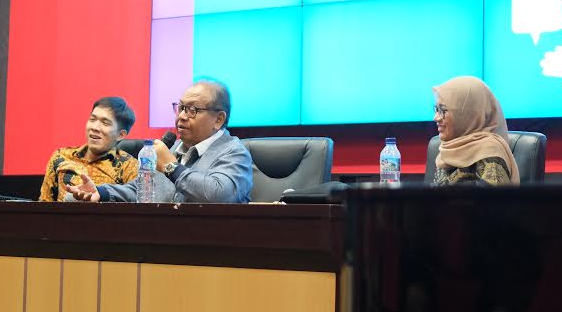Guest Lecture by KPMG Indonesia
- Details
- Written by FEB UGM
- Category: News
- Hits: 4338

On Friday, November 18, Department of Accounting, Faculty of Economics and Business Universitas Gadjah Mada (FEB UGM) together with KPMG Indonesia held a public lecture with a topic of “Audit for E-Commerce Industry”. This lecture aims to broaden students’ knowledge on the emerging business in the world, particularly in Indonesia which is the e-commerce. The lecture was held in Djarum Hall, Pertamina Tower level 6 and was open for public. Two prominent speakers from KPMG Indonesia are invited, Bapak Agung Nugroho Sudibyo (Senior Partner of KPMG Indonesia and Lecturer at University of Indonesia) and Bapak Angga Pujaprayoga (Senior Manager of KPMG Indonesia).
On previous Friday, November 11, FEB UGM also held a public lecture with Ernst & Young (EY), one of the big-four, with the topic of “Audit Completion”. The speaker from EY Indonesia was Bapak Chairul Wismoyo, manager of EY Indonesia as well as FEB UGM alumni. These public lectures are regularly held in FEB UGM as to align with the mission statements of Accounting Department FEB UGM, “to educate students to be competent and professional accounting graduates so as to promote the betterment of the society". Students are able to learn not only from text books but also gain valuable insights from real world case.
The first session with KPMG Indonesia, Bapak Angga Pujaprayoga presented a brief history of e-commerce in the world and in Indonesia, the current industry outlook as well as the current development of e-commerce regulations. As the fourth largest population in the world (Worldbank, 2015), Indonesia has potentially become the third biggest e-commerce market after China and India. At the beginning, Indonesia had no specific regulations concerning how it supposed to arrange the e-commerce business in general. Nowadays, the government through the Deputy Governor of Bank Indonesia issued a regulation whereas all economic transactions in Indonesia must use Indonesian Rupiah including the e-commerce business. Every website domain used in e-commerce business has to be registered to Ministry of Communication and Informatics of Republik Indonesia. While some e-commerce companies are mostly held by local investors, the Indonesia government is now open to attract foreign investments under certain arrangements. Bottom line, e-commerce business has grown significantly throughout the years, and the government is formulating regulations to support nationwide economic growth through digital economy.
The second session was delivered by Bapak Agung Nugroho Sudibyo and was mainly discussed about his experiences in auditing the e-commerce business. It is obvious that the fast development of technology has significantly impacted the audit process. The future audit process is mostly undertaken by technology, by using so-called an Artificial Intelligence (AI). A computer does the audit, while the human being, the auditors, are left to do the analysis and decision making process. Future audit will not use sampling method anymore since the technology is able to examine all audit evidence needed. Business intelligent as to improve the business process more efficient is the backbone of e-commerce business.
A lot of enthusiasm were shown by the students from Q&A session moderated by Ibu Arizona Mustikarini, lecturer in Accounting Department FEB UGM. The public lecture organised by Ikatan Mahasiswa Akuntansi UGM was closed by photo session with the speakers and students.
Source: Pramudita/feb


